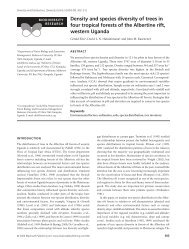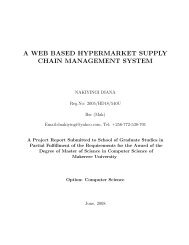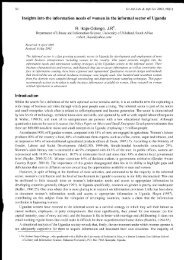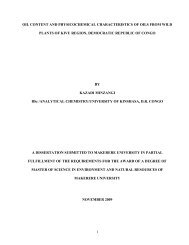THE UNIVERSITY OF LEIPZIG
THE UNIVERSITY OF LEIPZIG
THE UNIVERSITY OF LEIPZIG
Create successful ePaper yourself
Turn your PDF publications into a flip-book with our unique Google optimized e-Paper software.
iota. It is this biota that becomes the subject matter of investigation. It also develops from the<br />
embedded values that are ingrained within the subject matter that is under trail. 433<br />
Bioethics is therefore a product not necessarily incommensurable and even not invisible! It is<br />
the state of the common mind reflected in the institutional order. It is not a special science<br />
restricted to or within a particular field and subject-matter. But rather the main concerns are<br />
with the methods of inquiry and particular apparatus that are peculiar to the kind of task in the<br />
particular realm. 434 In this regard, the ethical problem is the general problem in contrast with<br />
which it is possible to speak of others as "special". Special because, we are somewhat dealing<br />
with biological issues but with ethical leanings.<br />
Therefore, ethical issues derived from this type of perspective will support and reinforce the<br />
basic insights underlying bioethics' current efforts to revolutionize biodiversity and natural<br />
resource conservation within an integrated institutional program. 435 The only danger of the<br />
latter effort is being undermined by an ethical analysis that is premised on the ground that<br />
there are alternative, individualistic and varied views of ethics, as seen in the neoclassical<br />
institutionalism and ethical paradigms. Thus as Klein and Edythe noted, for purely bioethical<br />
analysis to be conducted, the institutionalist perspective would seem, once again, to premise<br />
insights more in accordance with the needs of the transition underway, regarding biodiversity<br />
and natural resource usage today, than does the mainstream alternatives. 436<br />
In the theory of institutionalism and more so in the ethical progress, Ayres postulates his<br />
critique of classical and neo-classical ethical thought with a reminder that whether we take it<br />
or not, bioethics continues to be an undertaking involving a price, a price in the sense that<br />
ethical issues based on rationalism, which is based on economics rather than moral and social<br />
decisions. We are therefore talking of a science of value evaluation. 437 The analysis drawn<br />
from the above postulation informs that efforts to understand bio-ethics will therefore be<br />
found more meaningful if it is more associated with economics and less associated with moral<br />
or social relationships. Therefore, if bioethics has meaning related to economics, the problem<br />
of bioethics and institutionalism is to elicit that meaning.<br />
The above analysis presents the point of departure which is critical in the search for both a<br />
common good, common ground and a shared perspective that is necessary to ensure fruitful<br />
mitigation and collaboration between institutionalists, economists and bioethicists. In<br />
reference to understanding biodiversity, the challenges surrounding the amelioration of<br />
institutionalists, economists and bio-ethicists include: the introduction of technological and<br />
biochemical resources to the biodiversity sector, especially issues surrounding the genetic<br />
engineering prowess and threats evidenced by modern science research on one hand and the<br />
433 Lantos, J. D. 1994. "Ethics Committees and Resource Allocation." BioEthics Forum 10 Summer Fall.<br />
434 Ibid.<br />
435 Klein, P.A and Edythe S. M. 1996. Concepts of Value, Efficiency, and Democracy in Institutional<br />
Economics.Journal of Economic Issues 30: 267-77.<br />
436 Ibid.<br />
437 Lawson, C.L. 1998. The second Stage of Bio-ethics and Institutionalist Economics. Journal of Economic<br />
Issues 32:1187-1192.<br />
90






